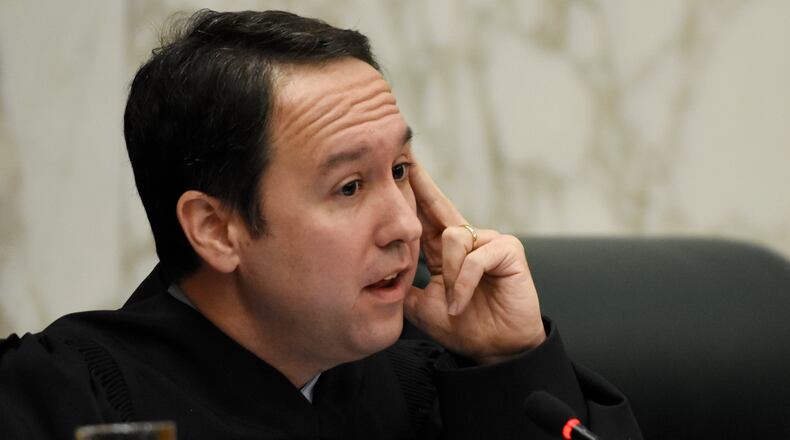The Georgia Supreme Court on Monday threw out a Fulton County murder conviction and criticized both prosecutors and police officers for pursuing a case against a suspect who had clearly and repeatedly invoked his right to remain silent.
Officers from the Milton Police Department should have known to stop questioning murder suspect Michael Grant when he declined to waive his Miranda rights, Justice Keith Blackwell wrote for a unanimous court. Moreover, Fulton prosecutors and state attorneys should have never defended such a “baseless” case, the justice wrote.
The ruling overturned the murder conviction against Grant for the 2013 killing of 19-year-old Christopher Walker, a marketing major and aspiring rapper. Walker died after being shot in the head during a struggle outside his home.
According to testimony, Grant, Richard Davidson and Matthew Goins followed Walker from a Taco Bell in Alpharetta to his home on a cul-de-sac in Milton.
One of Walker's neighbors identified Davidson as the person who shot Walker with a .40-caliber handgun after Walker refused to give up the gold herringbone chain he wore around his neck, court records show. In Monday's decision tossing out Grant's conviction, the Supreme Court upheld the murder conviction against Davidson. Goins, who was also charged, was acquitted at trial.
Grant did not dispute he was at the scene of the shooting, but he argued he was not a party to the crime.
After his arrest, Grant, handcuffed, was taken by Milton police to an interrogation room. At the outset, he said he was not waiving his Miranda rights.
“Do I want to waive my rights? No,” he said during the videotaped interview.
Even so, officers continued to implore Grant to talk to them. When Grant held firm, they left the room, then returned and read the Miranda warnings to him.
In response, Grant said flatly, “If I’m already under arrest, then I’ve got nothing to say about nothing.”
But the officers continued to question Grant until he finally stood and indicated he was ready to go to jail and be finished with the interview, the opinion said. Before he left, Grant told one investigator, “(Goins) didn’t know we planned on doing nothing, he was just trying to get home.”
Prosecutors said that statement by Grant was incriminating, and they convinced the trial judge to let it be used against him.
The state Supreme Court said that never should have happened.
“No reasonable officer could have understood these repeated statements as anything other than clear assertions of the right to remain silent,” Blackwell wrote. “The law is clear that, when a person in the custody of law enforcement officers unambiguously and unequivocally invokes his right to remain silent … the interrogation must cease immediately.”
ALSO FROM BILL RANKIN: Was Atlanta lawyer a mastermind embezzler or duped by 'habitual thief'?
As for prosecutors and state attorneys who argued against Grant’s appeal, Blackwell said, their obligation is to seek justice in every case.
“Sometimes, when a trial court has clearly gotten it wrong (even when it was the prosecution that originally led the trial court into that error), seeking justice on appeal means conceding the obvious error,” Blackwell wrote. “In those instances, that is the duty of the Attorney General and the district attorney.”
Grant’s lawyer, Benjamin Goldberg, applauded the high court’s decision. “We are grateful for the Georgia Supreme Court reaffirming one of the bedrock principles of the Constitution: when you invoke your right to remain silent, that election must be honored by law enforcement,” he said.
“We will definitely try this case again,” Fulton District Attorney Paul Howard said. “It is a murder.”
As for the court’s decision, “we can only add that our our general practice is to follow the facts and leave the ‘criticizing’ and ‘journalism’ to others,” Howard said. “We have represented the state and Fulton County in hundreds of matters before this court with overwhelming success. In fact, our decisions outnumber other jurisdictions by a wide margin. It is my hope that readers of the opinion will keep these facts in mind considering what was said in this single case.”
About the Author
The Latest
Featured




